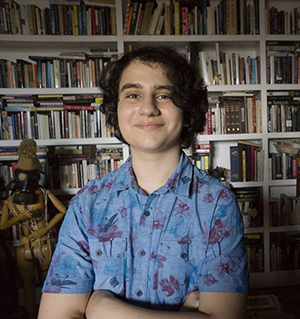BLOOM
★ ★ ★ ★
COMMUNISM, AS TOLD BY MY PARENTS

By Daniel Blokh
My family came to America in 1992, nine years before I was born. When I ask them if this was before or after the USSR fell apart, my father says, “After, of course. They wouldn’t have let us out [to America] if it was the USSR.”
When my parents did leave, they left the country under the pretense of visiting a friend there and just never came back. They were supposed to notify the embassy and become registered, but they were so scared of being sent back that they avoided it, even though the Union had fallen apart. My parents had good reason to be afraid. They had lived most of their lives under communism, and as soon as they were able to, they got away from it. When I ask them what it was like growing up in the Soviet Union, he tells me of a world where nothing could be trusted, where children were taught to blindly believe in the government and sacrifice themselves for the greater good, never questioning what happened around them. “Imagine that half of what everyone around you says is a lie. Teachers and parents try to make you believe certain ideas, even though you see evidence around you every day that disproves it. And you can’t say a word about it.”
There were those who believed in the cause, my mother tells me. But many did not. Her neighbor was a furniture delivery-man who made ten times as much money as her parents did. He would buy a massive supply of goods, and when shortages came—which they often did—he would resell them at double or triple the price. “They were filthy rich, but in the end, I don’t envy them. His wife was so terrified that he would be arrested for speculating and reselling goods that she had regular mental breakdowns.”
With each story they tell me, this constant paranoia becomes clearer and clearer. A soviet citizen could be arrested at any time for as much as a mere suspicion, let alone any attempt to criticize the government. On any day, the KGB could come to your door and take away a loved one, arrest them or put them in a mental institution that they would never leave. Time passed and the methods changed, but it was always possible for someone to be considered dangerous and “disappear.” If a family member was taken from you, you would have to publically denounce them or face the possibility of your own arrest. There was a feeling that your life was on a daily tightrope, perhaps seconds from plummeting away.
As my parents recall, the supposedly flawless government was riddled with lies and corruption. Yes, schooling was free, but often, one could get into a better school if they paid a bribe. People were assigned jobs and locations after finishing college, and, in the government’s attempt to move Jews out of Moscow, my mother’s parents were both sent into faraway unfamiliar cities (even though they were specifically prepared to carry out their jobs in Moscow). In their jobs, people stole often; my parents recall a saying at the time that went ‘Where you work is where you steal’. “In short,” my father says, “people lived in an utterly broken system, one which they could be arrested for calling less than perfect.”
After this discussion with my parents, my mother brings up a movie she wants us to watch. It’s a Russian film called Tomorrow Was the War. It was a political film made in 1987, so close to the end of the Soviet Union that it never got in trouble for exposing the dark side of communism. It’s a movie about teens, their experiences not so different from mine—adolescent romance, angst, arguments with parents, the like. But the movie changes when one of the main character’s father is arrested by the Cheka. The character must either publically denounce her father or be expelled from school and potentially arrested, a choice that leads the movie into an exploration of the teens’ reactions to the government they live under. It is painful to watch because, unlike many adults in the film, these kids at first believe what they’ve been told, and they’re having to watch it all fall apart before their eyes. After we finished the film, my father could only sigh. “It’s horrific,” he said at last. “You know the concept of sacred places, where god is supposed to be present? I wonder sometimes if Russia is the opposite of that, a completely cursed place.”
Among my friends, I often find those that romanticize communism in their critiques of capitalism. There are plenty of problems with capitalism, and it is certainly necessary to criticize it; that’s a topic for another article. And I am in full support of socialism, because when executed well, the government can help all while still allowing independence for citizens and not growing into authoritarianism. But when I see people talking about communism as a perfect alternative without being aware of how the system became corrupt in my parents’ home country, I’m irritated. For me, it is impossible to think of communism without considering the devastation it brought on the world my parents grew up in. I am afraid that people will forget that history, an age that feels far away to us now but still burns in the memories of those who experienced it. I am afraid that we are not being careful with the things we praise.
* * * *
For the poem in this column, I wanted to try something new and translate a Russian poem about communism. This poem, “Communists, Go Forth” was written by Mezhirov in 1947, and demonstrates the all-for-one, nationalistic attitude of the USSR. Keep in mind that poems that were not like this one and viewed the communists in a less-than-ideal light would have caused their writer to be arrested, so poets were often forced to write about things in fiercely patriotic ways, even if they did not truly believe that. Here is an excerpt of my personal translation.
Communists, Go Forth
Beneath February clouds –
Wind and snow,
But the soil smells of red hot steel.
The day comes closer,
The century goes on,
The Kremlin guard’s bayonets become covered with frost.
Everywhere,
Where the traces of bullets cross,
Or there, where great work blazes,
Through centuries,
across centuries,
forever,
until the end:
—Communists, go forth! Communists, go forth!

Daniel Blokh is a 15-year-old writer living in Birmingham, Alabama. He is the author of the memoir In Migration (BAM! Publishing 2016) and the micro-chapbook The Wading Room (Origami Poems Project 2016). His poetry chapbook, Grimmening, is forthcoming from Diode Editions in 2018. His work has been recognized by the Scholastic Art and Writing awards and the Foyle Young Poet awards, and has appeared in DIALOGIST, Gigantic Sequins, Forage Poetry, Avis Magazine, Thin Air Magazine, Cicada Magazine, and more.























